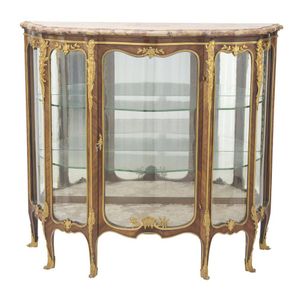Louis XV Style Vitrine with Ormolu Mounts
An ormolu mounted kingwood low vitrine in Louis XV manner, early 20th century, of serpentine bow front outline, the breche marble top above the glazed door and sides enclosing a mirrored interior with adjustable glass shelves, on swept feet, ormolu mounts throughout, 112 cm high, 125 cm wide, 49 cm deep
You must be a subscriber, and be logged in to view price and dealer details.
Subscribe Now to view actual auction price for this item
When you subscribe, you have the option of setting the currency in which to display prices to $Au, $US, $NZ or Stg.
This item has been sold, and the description, image and price are for reference purposes only.
- Mounts - Mounts are used to describe bronze, brass and ormolu adornments on furniture especially quality furniture in the rococo and classical revival style, and are also the cabinet makers' name for the metal fittings on furniture, such as hinges, locks and handles, and metal edges and guards which protect furniture from damage.
- Bow Front - The front is shaped in a gentle curve or bow. Introduced during the 18th century, the bow-front is associated with furniture of the Hepplewhite and Sheraton period, though of course the form continued to be used throughout the 19th century. Bow-fronted pieces are usually veneered, although some were cut from the solid wood. Where veneer is used, the carcase is cut either from pine or deal, or sometimes the front was built up and shaped with small timber 'bricks'. Commonly used on various types of furniture including chairs, settees, chests, side tables, sideboards and display cabinets.
- Serpentine - Resembling a serpent, in the form of an elongated 'S'. A serpentine front is similar to a bow front, except that the curve is shallow at each end, swelling towards the middle. The term presumably derives from its similarity to a moving snake or serpent. Serpentine fronts are usually veneered, with the carcase either being cut and shaped from a solid piece of timber, or built in the 'brick' method.
- Ormolu - Ormolu was popular with French craftsmen in the 18th and 19th century for ornamental fittings for furniture, clocks and other decorative items. True ormolu is gilt bronze, that is bronze that has been coated with gold using a mercury amalgam. Due to the health risks associated with using mercury, this method of creating ormolu was discontinued in France in the 1830s. A substitute was developed consisting of about 75% copper and 25% zinc, however it was inferior to the bronze version. It was often lacquered to prevent it tarnishing.
This item has been included into following indexes:
- display cabinets, material - kingwood 56
- display cabinets, origin - French 406
- display cabinets, period, age or style
- vitrines - (upright display cabinet) 297
